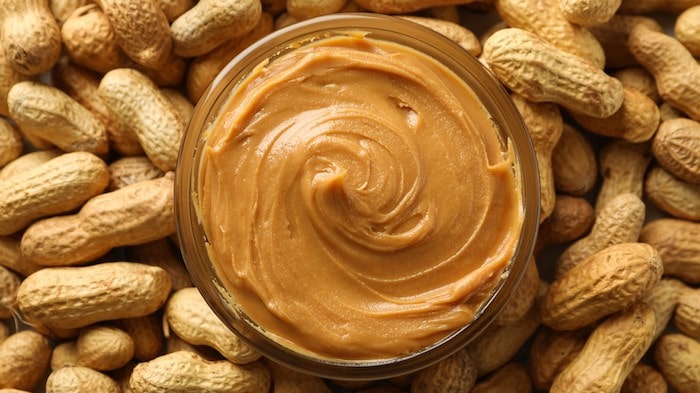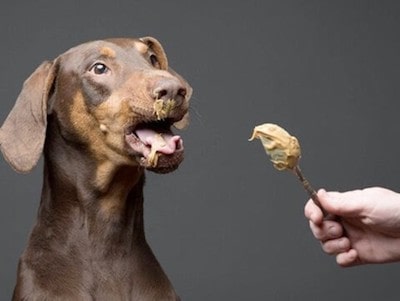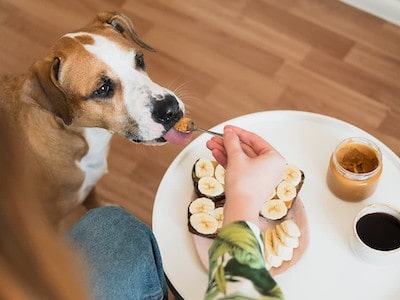If you’ve ever wondered why dogs go absolutely bonkers for this creamy treat, you’re not alone. The sight of a wagging tail and a slobbery tongue eagerly lapping up peanut butter from a spoon is a common and often hilarious occurrence in many households.
But what exactly is it about this nutty spread that has such an irresistible appeal to our canine companions? In this article, we’ll uncover the reasons behind why dogs like peanut butter and explore the scientific and behavioral aspects that contribute to their peanut butter passion.
So, grab a jar of peanut butter (for your pup, of course) and join us on this delightful journey of discovery!
What is Peanut Butter And Why Do Dogs Love It?
A paste known as peanut butter is created from roasted peanuts, typically with the addition of salt, sugar, and oil. It attracts to many people and animals because of its creamy, rich texture and nutty flavour. Additionally rich in nutrients and energy-producing proteins, healthy fats, vitamins, and minerals is peanut butter.
For a variety of reasons, dogs enjoy peanut butter. One is that they enjoy the flavour of it. Despite having fewer taste buds than people, dogs can nonetheless sense sweet and salty flavours. Since it possesses both of these characteristics, peanut butter is a delectable treat for dogs.

They like the way it smells, which is another factor. Dogs can detect peanut butter from a great distance away because they have a far better sense of smell than humans do. Additionally, the powerful aroma of peanut butter can cover up the odours of other things like drugs or meals that dogs dislike.
The fact that it makes people feel good is another aspect. Dogs like to lick and chew on the sticky, gooey texture of peanut butter. Additionally, as they want to use every last piece of their toys or spoons, it may keep them occupied and amused for a very long time.
The Benefits of Peanut Butter for Dogs
Peanut butter can be beneficial for dogs in moderation. Some of the benefits include:
- It can provide protein, healthy fats, vitamins, and minerals that can support dogs’ growth, development, immune system, skin, coat, and overall health.
- It can help dogs gain weight if they are underweight or have a poor appetite due to illness or stress.
- It can help dogs lose weight if used as a low-calorie treat or mixed with high-fiber foods such as carrots or apples.

- It can help dogs with dental health by scraping off plaque and tartar from their teeth and gums.
- It can help dogs with mental health by reducing boredom, anxiety, and stress. It can also stimulate their brain and improve their cognitive function.
- It can help dogs with socialization and training by rewarding them for good behavior and reinforcing positive associations.
The Risks of Peanut Butter for Dogs
Peanut butter can also be harmful for dogs if given too much or too often. Some of the risks include:
- It can cause allergies or intolerances in some dogs. Some dogs may be allergic to peanuts or other ingredients in peanut butter, such as soy or corn. This can cause symptoms such as itching, swelling, hives, vomiting, diarrhea, or difficulty breathing. If you notice any of these signs in your dog after giving them peanut butter, stop immediately and contact your vet.
- It can cause obesity or diabetes in some dogs. Peanut butter is high in calories and fat, which can lead to weight gain and health problems if given too frequently or in large amounts. Excess sugar can also spike dogs’ blood sugar levels and increase their risk of developing diabetes.
- It can cause pancreatitis in some dogs. Pancreatitis is a serious condition where the pancreas becomes inflamed and unable to produce enough digestive enzymes. This can cause severe abdominal pain, vomiting, diarrhea, dehydration, fever, and even death. High-fat foods such as peanut butter can trigger pancreatitis in some dogs, especially those who are prone to it or have a history of it.

- It can cause choking or intestinal blockage in some dogs. Peanut butter can be hard to swallow for some dogs, especially those who are greedy or have small mouths or throats. This can cause them to choke or gag on the peanut butter.
- Peanut butter can also stick to the roof of their mouth or get stuck in their teeth or gums. This can prevent them from breathing properly or cause infections. Peanut butter can also form clumps or balls in their stomach or intestines that can obstruct their digestion and cause constipation or impaction.
To avoid these risks, you should follow these tips when feeding peanut butter to your dog:
- Choose natural or organic peanut butter that has no added salt, sugar, oil, preservatives, artificial flavors, or colors. These additives can be harmful for your dog’s health and increase the risk of allergies or intolerances.
- Check the label for xylitol, a sugar substitute that is toxic for dogs. Xylitol can cause low blood sugar levels (hypoglycemia), liver failure, seizures or death in dogs even in small amounts. Xylitol is often found in low-sugar or sugar-free peanut butters as well as other products such as gum, candy or toothpaste.
- Give your dog only a small amount of peanut butter at a time (about one teaspoon per 10 pounds of body weight) and not more than once a day.
- Use peanut butter as an occasional treat or reward rather than a regular part of your dog’s diet.
- Monitor your dog’s reaction to peanut butter and stop if you notice any signs of discomfort or distress.
- Consult your vet before giving peanut butter to your dog if they have any medical conditions or dietary restrictions.
Tips and Tricks To Feed Peanut Butter To Dogs
There are many ways to feed peanut butter to your dog that can make it more enjoyable and beneficial for both of you. Some of the best ways include:
- Filling a Kong toy with peanut butter and freezing it overnight. This will create a long-lasting and cooling treat that your dog will love licking and chewing.
- Smearing some peanut butter on a lick mat or spoon and letting your dog lick it off. This will stimulate their tongue and saliva and keep them occupied and calm.
- Mixing some peanut butter with plain yogurt or pumpkin puree and freezing it in an ice cube tray. This will create bite-sized treats that are easy to digest and nutritious for your dog.

- Spreading some peanut butter on a slice of apple or banana and giving it to your dog as a snack. This will add some fiber and antioxidants to their diet and satisfy their sweet tooth.
- Hiding some peanut butter inside a hollow bone or chew toy and letting your dog find it. This will challenge their nose and brain and reward them for their curiosity and persistence.
FAQ
In moderation, peanut butter can be a safe and healthy treat for dogs. However, it’s important to choose peanut butter brands that are free from xylitol, a sweetener that is toxic to dogs. Also, some dogs may have allergies or sensitivities to peanuts, so it’s essential to monitor their reactions when introducing peanut butter into their diet.
While dogs can enjoy peanut butter as an occasional treat, it should not be a daily staple in their diet. Peanut butter is high in calories and fat, so excessive consumption can lead to weight gain and potential health issues. It’s best to consult with your veterinarian to determine the appropriate frequency and portion size of peanut butter for your individual dog.
If your dog has a peanut allergy or sensitivity, there are alternative nut and seed butters available, such as almond butter or sunflower seed butter. However, it’s crucial to check the ingredients and ensure that these alternatives do not contain any substances that are harmful to dogs. Consulting with a veterinarian is advisable to determine the best options for your dog’s specific needs.
Puppies can enjoy peanut butter, but it should be given in moderation and introduced gradually into their diet. It’s important to choose a peanut butter brand without additives like xylitol and to monitor the puppy’s response for any signs of allergies or digestive issues. As with adult dogs, it’s best to consult with a veterinarian for guidance on appropriate portions and frequency.
Conclusion
In conclusion, the love that dogs have for peanut butter is a delightful and amusing phenomenon. The combination of its enticing aroma, rich flavor, and sticky texture makes it an irresistible treat for our canine companions. While peanut butter can be a safe and enjoyable indulgence for dogs, it’s essential to choose a brand without harmful additives like xylitol and to feed it in moderation.
By understanding why dogs like peanut butter, we gain insights into their taste preferences and behaviors. Peanut butter can serve as a source of protein, healthy fats, and mental stimulation for dogs. It can also be used as a clever way to administer medication or alleviate boredom through interactive toys.
However, it’s crucial to consider individual factors such as allergies, sensitivities, and overall dietary needs when introducing peanut butter or its alternatives to dogs. Consulting with a veterinarian will ensure that you make informed choices that promote your dog’s health and well-being.

Ellis is a retired veterinary technician and full-time contributor at DogLovesBest. He likes writing about pet health care tips and reviews the products that are useful for fidos on a daily basis.
Ellis also guardians a Siberian husky, Nova, and a cat named Shilly. They all live happily with his wife Ammy, and both the dogs on a seaside apartment in Queens, NY.
